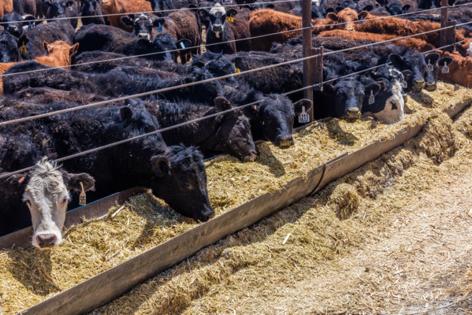Trump demands cattle ranchers lower prices, deepening feud
Published in Business News
President Donald Trump attacked U.S. cattle ranchers over their criticism of his plan to slash record beef prices by importing significantly more tariff-free meat from Argentina, deepening a quarrel with a group of reliable supporters and raising concerns among ranch-state Republican lawmakers.
Trump on Wednesday said that cattlemen should be grateful for his tariff policies, saying they have helped boost their profits. At the same time, he also implored them to lower the cost of their products.
“If it weren’t for me, they would be doing just as they’ve done for the past 20 years — Terrible! It would be nice if they would understand that,” the president posted on social media. “They also have to get their prices down, because the consumer is a very big factor in my thinking, also!”
The U.S. plans to increase the tariff-rate quota for Argentina to 80,000 metric tons of beef — effectively quadrupling the amount exempt from 26.4% tariffs, a White House official said later Wednesday. The Agriculture Department also said it would seek to expedite regulatory reforms and increase processing capacity to lessen the impact on U.S. farmers.
“We are committed to ensuring the American people have an affordable source of protein and that America’s ranchers have a strong economic environment where they can continue to operate for generations to come,” said Agriculture Secretary Brooke Rollins in a statement.
The president’s comments come one day after Senate Majority Leader John Thune and other Republicans said they raised the concerns of ranchers during a White House lunch. Several said they’ve also spoken this week with Rollins, Treasury Secretary Scott Bessent and U.S. Trade Representative Jamieson Greer.
Thune, a South Dakota Republican, said he’s discussed importing beef from Argentina “extensively” with the White House. North Dakota Republican Senator John Hoeven said he has emphasized in meetings with Trump and other cabinet members that ranchers want to be the ones to create more U.S. supply to bring down prices.
“The answer is let the markets continue to recover,” Senator Steve Daines, a Montana Republican, said Wednesday, adding that ranchers are “finally getting to the point where they’re making money again and they’re very concerned about these actions.”
The dust-up illustrates the dilemma facing Trump as he ratchets up import taxes to their highest levels in a century. While the duties have helped protect some American industries, they have also helped drive up prices for consumers — cutting against his campaign promise to tackle inflation.
Trump’s plan to increase Argentine beef imports has been met with scorn by ranchers, who have said it could crush their industry, while experts say it would do little to lower prices. Argentine beef accounts for only about 2% of U.S. beef imports and increasing supplies may only have a marginal effect on what consumers pay.
Bill Bullard, chief executive officer of the Ranchers-Cattlemen Action Legal Fund, United Stockgrowers of America, said in a statement Monday that increased Argentine imports “will reduce demand for domestic cattle.”
“President Trump should direct his antitrust enforcers to determine the extent to which the alleged unlawful price fixing has contributed to today’s higher beef prices,” Bullard said.
U.S. beef prices have skyrocketed to record levels, challenging Trump’s pledge to make groceries more affordable. Booming imports have fallen short of offsetting a severe domestic cattle shortage. Tariffs totaling 50% on imported goods from Brazil, the world’s largest beef exporter, are tightening supplies further.
At the same time, many farmers grappling with lower soybean and corn prices due to Trump’s trade war with China say that beef revenue is crucial to keeping their operations afloat.
Rollins said Tuesday the administration will soon roll out a “big package” intended to bolster U.S. beef production as consumers struggle with a surge in prices.
“What we are going to do is to incentivize to open up new lands, to make it easier to become a rancher, to build more processing plants around the country, so there aren’t just a handful in the middle of the country,” Rollins said in an interview with CNBC.
She added that the U.S. had over the years sent a lot of its beef production to countries like Brazil, and that now was the time to reverse course, saying “We’ll be able to begin to move the onshoring of beef back to America.”
(With assistance from Laura Curtis and Erik Wasson.)
©2025 Bloomberg L.P. Visit bloomberg.com. Distributed by Tribune Content Agency, LLC.












Comments